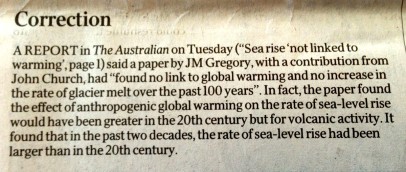
Every day there are dozens of new research papers on climate change related matters published, monthly there are thousands of them. In addition to the peer reviewed literature hundreds if not thousands of white papers, articles and blog posts are produced by the science community on climate change.
And while this cornucopia knowledge can be overwhelming even for the most dedicated reader on the topic, it represents a rich field of opportunity for those who wish to mischaracterise the work of scientists.
We are of course talking about the practice of cherry picking: selecting data and quotes from the vast sea of climate change related informaiton and reproducing it out of context. In doing so, opponents to mainstream science hope to cast doubt on the scientific consensus and undermine the public’s trust in scientists by taking their words out of context.
Two recent examples illustrate the practice of cherry picking by sceptics. In addition some suggestions are made to avoid or mitigate this tactic.
The Australian: no link between sea level rise and global warming?
The first example is that of The Australian’s misleading coverage of recent research on sea level rise. Environment Editor Graham Lloyd wrote a series of articles implying that there was no link between sea level rise and global warming during the 20th century.
Lloyd referenced the paper Twentieth-century global-mean sea-level rise: is the whole greater than the sum of the parts? and seized upon by the following sentence in the abstract:
“Semi-empirical methods for projecting GMSLR (global mean sea level rise) depend on the existence of a relationship between global climate change and the rate of GMSLR, but the implication of our closure of the budget is that such a relationship is weak or absent during the 20th century.
A reading of the entire paper suggests no such thing. As Graham Readfearn pointed out it was merely an attempt to “murder a scientific paper” by cherry picking a single sentence. Indeed one of the papers authors, John Church stated the article produced by Lloyd was misleading.
Fortunately in this case The Australian was forced acknowledge the article was factually incorrect, even going so far to issue a rare correction.
Did NASA scientist James Hansen really admit global warming “stalled”?
The second and most recent example is provided by sceptical blogger Anthony Watts (Watts up with that?).
Watts cherry picked a quote form a recent paper by noted NASA scientist James Hansen, implying Hanesen recently admitted there has been no global warming for the last 16 years:
Dr. James Hansen and Reto Ruedy of NASA GISS have written a paper (non peer reviewed) with a remarkable admission in it. It is titled Global Temperature Update Through 2012.
Here is the money quote, which pretty much ends the caterwauling from naysayers about global temperature being stalled for the last decade.
The five-year mean global temperature has been flat for the last decade, which we interpret as a combination of natural variability and a slow down in the growth rate of net climate forcing.
Gosh, I thought Hansen had claimed that “climate forcings” had overwhelmed natural variability?
A simple check of the original source demonstrates the clumsy manner in which Watt’s has cherry picked the quote to turn it into a “money quote” about stalled global temperatures. Here is the sentence in context (relevant quote underlined):
Global surface temperature in 2012 was +0.56°C (1°F) warmer than the 1951-1980 base period average, despite much of the year being affected by a strong La Nina. Global temperature thus continues at a high level that is sufficient to cause a substantial increase in the frequency of extreme warm anomalies. The 5-year mean global temperature has been flat for a decade, which we interpret as a combination of natural variability and a slowdown in the growth rate of the net climate forcing.
An update through 2012 of our global analysis (Fig. 1) reveals 2012 as having practically the same temperature as 2011, significantly lower than the maximum reached in 2010. These short-term global fluctuations are associated principally with natural oscillations of tropical Pacific sea surface temperatures summarized in the Nino index in the lower part of the figure. 2012 is nominally the 9th warmest year, but it is indistinguishable in rank with several other years, as shown by the error estimate for comparing nearby years. Note that the 10 warmest years in the record all occurred since 1998.
The long-term warming trend, including continual warming since the mid-1970s, has been conclusively associated with the predominant global climate forcing, human-made greenhouse gases, which began to grow substantially early in the 20th century.
As can be seen Watts has merely lifted a single sentence to mischaracterise the paper. Hansen and Ruedy do provide the appropriate context, highlighting the fact that “the 10 warmest years in the record all occurred since 1998”.
So in this charged environment what can the scientific community do to mitigate such abuses?
Don’t give them cherries
Real Climate noted the sentence in the Church et.al. sceptics seized upon was “awkwardly phrased”. However the Hansen and Ruedy paper is well written, clear and when seen in context the cherry picked sentence makes perfect sense.
For this reason scientists should not berate themselves for seeing their own words used against them.
A first step – and not to slight the authors of the paper on sea level rise – would be to avoid giving sceptics the oppurtunity to pick low-hanging fruit (it is acknowledged the vast majority of scientists are indeed very careful).
However, Watts unintentionally reveals the mindset of climate sceptics by referring to the sentence he lifted from the Hansen/Ruedy paper as a “money quote”.
Sceptics such as Watts are not engaged in reading the scientific literature in an intellectually honest way: they are hunting for anomalies. Regardless of how much caution a scientist may take, it is inevitable sceptics will cherry pick the literature in order to cast doubt on the science.
Stopping the lie before goes around the world: rapid response and press council complaints
To quote Mark Twain “a lie will go round the world while truth is pulling its boots on.” But once the lie has taken flight how should we respond?
Rapidly, calmly and with the facts.
The recent example of The Australian being forced to issue a rare correction offers a salient lesson in dealing not only with the claims of climate sceptics, but with blunting a potent “meme”.
Sites such as Skeptical Science, Real Climate, DeSmogBlog, The Conversation and Climate Progress are all excellent platforms for countering misinformation. Were possible, getting corrections published in the mainstream media is worth pursuing. That includes authoring articles or writing letters to the editor. Even jumping into the forum comments might help undo some of the damage.
Nor should individuals and scientists be afraid to take their concerns to regulatory bodies such as the Australian Press Council (PAC) to tackle misinformation that appears in the mainstream media (MSM).
A member of the public is free to lodge a complaint; however doing so is not a trivial matter. It is vital to review the guidelines for making a complaint.
While sceptics often cry “censorship” when they find themselves corrected, it is vital to counter their misinformation.
 Can you see a pause in the warming of the planet?
Can you see a pause in the warming of the planet?
